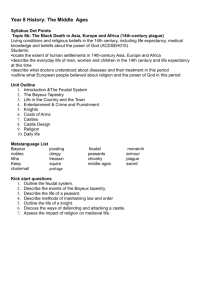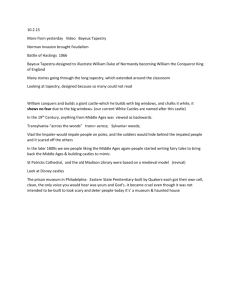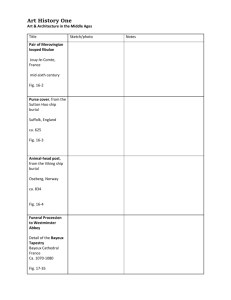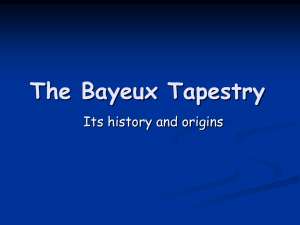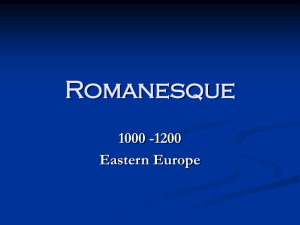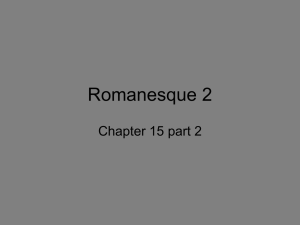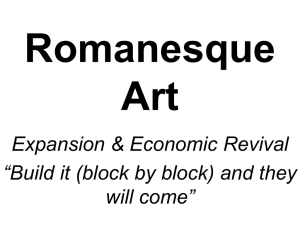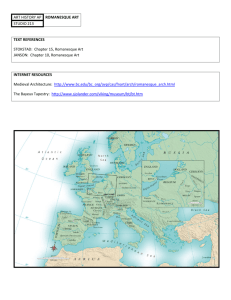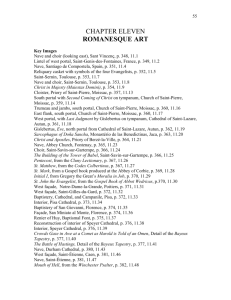chapter 17-4 - Cloudfront.net
advertisement
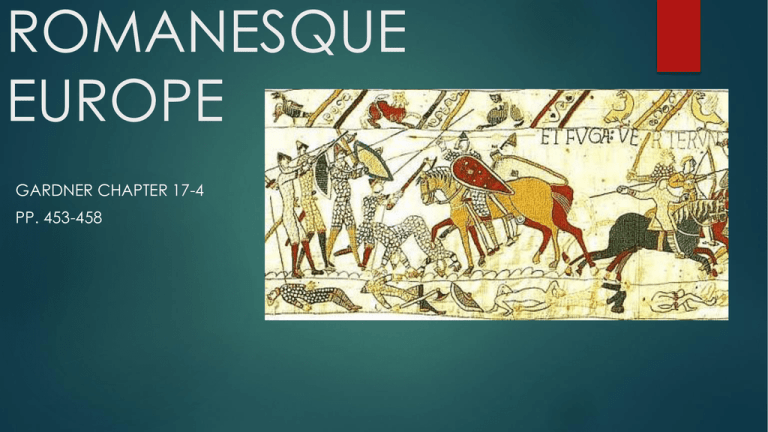
ROMANESQUE EUROPE GARDNER CHAPTER 17-4 PP. 453-458 NORMANDY AND ENGLAND ARCHITECTURE Vikings convert to Christianity in early 10th century -> settle on N. coast of France in present-day Normandy The Normans were 1. aggressive warriors 2. skilled administrators 3. builders SAINT-ETIENNE, CAEN West façade of Saint-Etienne, Caen, France, begun 1067 The masterpiece of Norman Romanesque architecture -> begun by William the Conqueror West façade is a striking design in the tradition of Carolingian and Ottonian westworks -> 4 large buttresses divide the façade into 3 bays Towers display a triple division -> spires are a later Gothic addition Interior of Saint-Etienne, Caen, France, vaulted ca. 1115-1120 Groin vaults made possible an efficient clerestory Three story elevation w/large arched openings provides ample light and makes the nave appear taller than it is Light and airy quality that is unusual in the Romanesque period DURHAM CATHEDRAL Interior of Durham Cathedral, England, begun ca. 1093 William of Normandy/William the Conqueror’s conquest of AngloSaxon England in 1066 began a new epoch in English history Interior and lateral section of Durham Cathedral, ca. 1093 Several of the classroom scenes at Hogwarts were filmed at Durham Cathedral Typically English in its long, slender proportions -> in the nave, simple pillars alternate w/compound piers that support the transverse arches of the 7-part groin vaults First example of a ribbed groin vault over a three-story nave -> quadrant arches in the tribune EMBROIDERY AND TAPESTRY Funeral procession to Westminster Abbey, detail from the Bayeux Tapestry, from Bayeux Cathedral, France, ca. 1070-1080, embroidered wool on linen, 1’8” high -> entire length is about 230 feet long The most famous embroidery of the Middle Ages is The Bayeux Tapestry EMBROIDERY = decorating textiles by sewing in patterns onto fabrics w/thread BAYEUX TAPESTRY 11th century work of art that is the Bayeux Tapestry, is a band of material 70 m by 0.50 in linen embroidered with colored wool setting out in 58 scenes the reasons and circumstances surrounding the overseas expedition of William the Conqueror, Duke of Normandy, and his army in 1066 This masterpiece, which is unique in the world, was probably commissioned by Odo, half brother of William and Bishop of Bayeux, to an Anglo-Saxon workshop, to be presented subsequently in the nave of the city’s cathedral. BAYEUX TAPESTRY Edward the Confessor -> AngloSaxon king of England dies William of Normandy -> Normans believed Edward had named William as rightful heir Harold -> is named Anglo-Saxon king of England THE NORMAN CONQUEST -> William invades England -> defeats Harold at the Battle of Hastings William rewarded his supporters with land and power. He is depicted in the Bayeux Tapestry with his half-brothers Odo, Bishop of Bayeux and Robert of Mortain. These two men fought alongside him at the Battle of Hastings. When the King returned to Normandy in 1067 he appointed Odo of Bayeux as one of the two people who would share the position of regent in his absence. BURY BIBLE Master Hugo, Moses expounding the law, folio 94 recto of the Bury Bible, England, ca. 1135, ink and tempera on vellum Master Hugo was a rare Romanesque lay artist -> one of the emerging class of professional artists and artisans who depended for their livelihood on commissions from well-endowed monasteries EADWINE PSALTER EADWINE THE SCRIBE(?), Eadwine the scribe at work, folio 283 verso of the Eadwine Psalter, ca. 1160– 1170, Ink and tempera on vellum Portrait represents a living man, not sacred person -- emergence of the artist More naturalistic representation marks a turning point in Medieval representation towards representational art of the Renaissance.


